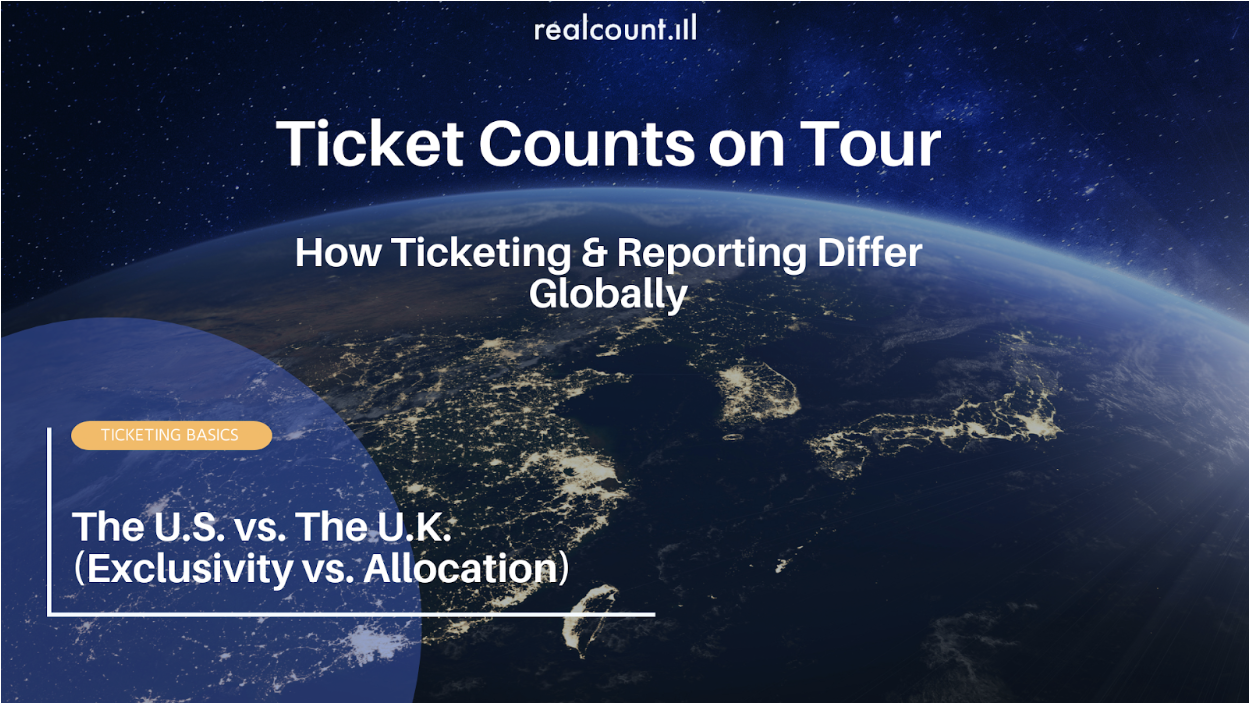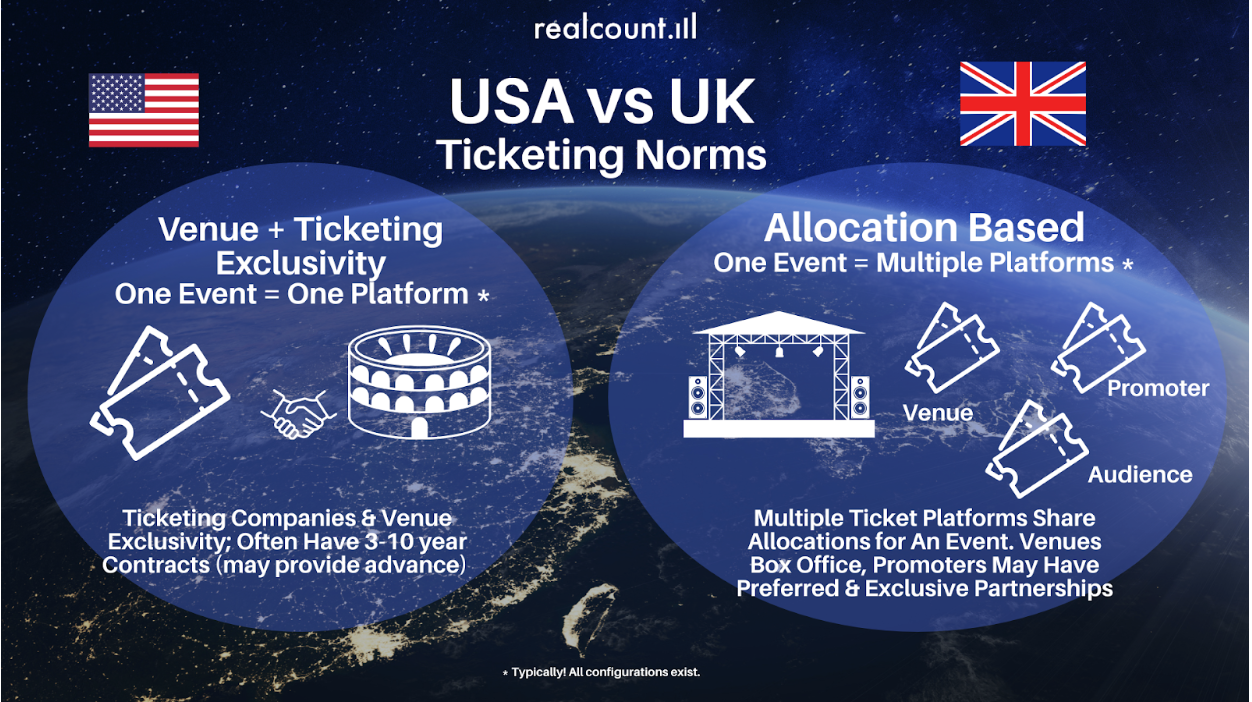Data Analysis
05 Aug 2025
Diana Gremore
Ticket Counts on Tour: How Ticketing & Reporting Differ Globally

Part 1 – The U.S. vs. The U.K. (Exclusivity vs. Allocation)
Ticketing is a global business. Yet, for something so common, there are huge regional differences in how ticket sales are reported.
In this series, we’ll look at ticket counts from around the world - how they work, why they differ, and what that means for artists, promoters, and touring teams.
Today, we’re starting with the U.S. and the U.K.
First, A Quick Recap
If you aren’t familiar with ticket counts, check out our earlier 101 blog - but here’s the quick version:
A ticket count is simply the number of tickets sold. Sounds easy, right? In reality, with multiple ticketing companies, different sales setups, and global quirks, it’s rarely straightforward.
In the U.S., counts might come from box office reports, dashboards, or even a weekly “Hey there, how many tickets are sold?” email. Across the pond, the process remains the same - but tickets for an event are often sold across multiple platforms, which doubles the collection time.
Either way, teams end up stitching together data from spreadsheets, screenshots, and emails just to see the full picture.
That’s why ticket count reports are both critical - and painful. They are often manually compiled to give a complete view of sales across platforms and markets.
The U.S. – Exclusive Venue Contracts
In the U.S., venues often have exclusive deals with a single primary ticketing company. In most cases, it’s one event = one ticketing platform.
What does this mean for ticket counts?
Because sales are usually consolidated on one platform, artist teams can often get direct updates emailed from the ticketing company - sometimes weekly, sometimes daily, and occasionally as often as every 15 minutes. These updates are then gathered into sheets for tracking and review.
Promoters do the same, often collecting counts from multiple venues they’re promoting in. They review sales on a daily or weekly basis to gauge performance and make projections.
💡 Even with daily updates, manual work is common.
At the club touring level, many ticketing systems across clubs, theatres, amphitheatres, PACs, and casinos don’t allow automated reporting. That means someone on the venue or promoter side is still emailing figures - at least weekly.
And this isn’t just a ‘small venue’ problem - even major global promoters who own ticketing platforms still book shows in venues with exclusive contracts elsewhere. Their teams can spend hours manually collecting sales figures into spreadsheets.
While most events in the U.S. have one exclusive primary ticketing partner, there are still situations that require multi-platform tracking (our bread and butter at RealCount!). Sometimes artists bring in off-platform pre-sales using platforms like Seated, or events might allocate a small percentage (often around 10%) to genre- or audience-focused ticketing partners.
The U.K. – Allocation-Based Ticketing
In the U.K., it’s common for a single event to be sold through multiple ticketing companies, each holding their own allocation of tickets.
What does this mean for ticket counts (primarily known locally as ‘ticket figures’)?
When booking an artist, the promoter is often responsible for managing and tracking these allocations. Allocations are typically divided between:
- The venue box office’s ticketing system
- The promoter’s preferred ticketing partner
- Audience-based ticketing platforms (where ticketing also serves as marketing)
Because sales are spread across multiple platforms, tracking the total for a single event takes more effort. Promoters or buyers have to log into different backends, contact local box offices, receive ticket audits, and then combine these reports into one complete picture for the artist team.
💡 Updates are less frequent in the U.K.
It’s very common for promoters and venues to only send sales updates on Mondays and Thursdays, with extra attention on Fridays for new on-sales.
From RealCount’s own data set, we’ve calculated macro-average ticketing splits for allocation-based events:
- Venue: 50.9%
- Promoter: 36.2%
- Audience-focused ticketing: 12.9%
Of course, these percentages vary by market, artist, and event - but they’re a useful benchmark for understanding how tickets are distributed in the U.K.
While allocation-based ticketing can help reach more buyers through different sales channels, it also means more manual work for promoters and artist teams - exactly the type of challenge RealCount was built to solve.

At RealCount, we’ve developed allocation-based tracking, presale tracking, and multi-platform integrations to help event stakeholders - from artists and promoters to venues - stay on top of their sales in real time. We pull data from over 200 ticketing companies worldwide into one clear view, so you can see how your tickets are moving right now, understand their momentum over time, and act quickly to optimize booking, marketing, and touring decisions.
Stay tuned for more markets in our series as we cross continents and explore ticket counts globally.
Ticket Counts on Tour – Powered by RealCount. Tracking sales globally. Understanding them locally.

© 2025 RealCount Inc.
Privacy Policy
Terms of Service
Contact Us
info@realcount.pro
Stay Connected
Subscribe to our newsletter to receive product updates & monthly tips.